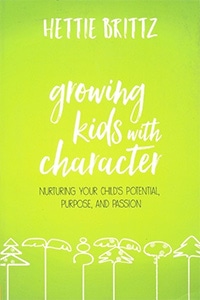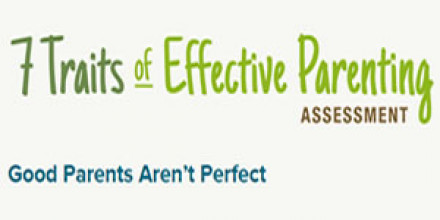Parent #1: My youngest daughter is super shy.
Parent #2: Our son, Will, has a fiery personality.
Parent #3: The polar opposite of me.
Parent #2: Yeah, his personality couldn’t be, probably, farther from mine.
Parent #1: A little bit obstinate. Not at all like me. Well, maybe a little bit like me.
Jim Daly: (laughs)
John Fuller: Maybe you’ve seen some of those personality traits in your children.
Jim: (laughs)
John: Today on Focus on the Family we’ll explore different personalities and how to navigate those in your family. Your host is Focus president and author Jim Daly, and I’m John Fuller.
Jim: John, God has wired each one of us so uniquely, like a fingerprint, right? And learning who your children are and how they think and what drives them are such critical skills for parents to develop, we concentrate on (laughing) that here Focus. And the reason is because a common mistake can be expecting your kids to be just like you. But before long, uh, you’re gonna discover that’s not the case at all.
John: Mm-hmm.
Jim: I’ve always been fascinated by personality types, and I think God made us different and unique on purpose. And we as parents get the opportunity to kind of discover what God is doing and what He has in store for each of our children.
John: Our guest today is Hettie Brittz. She’s an author and speaker, and she’s done extensive research into personality and parenting and has written a book that we’ll hear more about called Growing Kids of Character: Nurturing Your Child’s Potential, Purpose and Passion. Check it out at focusonthefamily.com/broadcast. And now, Jim, here’s how you began the conversation with Hettie Brittz on today’s Focus on the Family.
Jim: Uh, Hettie, you’re from South Africa, u- um, we call mom’s “mum’s” there, M-U-M.
Hettie: (laughs)
Jim: I know that’s-
Hettie: Yes.
Jim: … important to you, right?
Hettie: (laughs)
Jim: But it’s so much fun, and I have spent… I think I made 30, 35 trips to South Africa. I love the country. I pray for the country-
Hettie: Thank you.
Jim: … and the families of that country.
Hettie: Mm-hmm.
Jim: There are some great parents in South Africa. Honestly. I learned a lot about parenting through friends of mine there. And I-
Hettie: Mm-hmm.
Jim: … just love kind of some of that casual observation, uh, many people in South Africa do it almost as second nature. Why is that? Why do you think a culture-?
Hettie: Mm-hmm.
Jim: … learns to understand their kids in that way?
Hettie: I think fathers have been involved, um, for many generations, and I think there is an intentionality about parenting when you’re in a country where things are tough.
Jim: Yeah. And it’s not different around the world, is it? Th- uh, that’s one of the wonderful things I learned. Focus On the Family you think of these American issues, you know, of parenting. Certainly there’s uniquenesses, but problems, uh, in being a good parent and problems with the kids are pretty universal, aren’t they?
Hettie: They definitely are. We all want the best for our kids. We all misunderstand our kids at times. Our kids misbehave.
Jim: Not here-
Hettie: We misbehave-
Jim: … in America.
Hettie: (laughing) It’s everywhere.
Jim: (laughs) But it’s true. And it’s human nature. That’s-… what makes it universal. Hettie let’s get into it. Um, this is a great book, Growing Kids with Character. I mean, I… It’s funny. Jean and I were talking about a little issue we were facing with our (laughing) kids yesterday, and I, you know, cracked the book open, began to look through it and read the prep. And I’m thinking, “Oh, this is perfect. Growing Kids With (laughing) Character.”
Hettie: (laughs)
Jim: Every mom and dad wants to achieve this.
John: Mm-hmm.
Jim: And this a great tool, and I’m anxious to get into it. Uh, you believe that temperament is part of the soul’s DNA. And I agree, but how do we come into this world pre-stamped by God? What do you think is happening?
Hettie: Oh, He dreams us up. He, He has a, a plan. And I think it’s so important for Him that we follow that plan that He, He builds in a little bit o- bit of a compass and He magnetizes it, and He gives each one of us our true north. And then He takes great joy in seeing how parents accompany their kids in the right direction.
Jim: Yeah.
Hettie: He planned everything He made. There is design in everything in, in creation that points to purpose.
Jim: I agree.
Hettie: So, if we are purpose, then we have to be designed.
Jim: Yeah, and I love that.
Hettie: And, yeah, it’s beautiful.
Jim: Y- You s- you, uh, mentioned there that in the book you didn’t feel, uh, becoming a mom for the first time that you were emotionally ready. Now-
Hettie: (laughs)
Jim: … every woman that’s pregnant for the first time is saying, “That’s me! That’s me!” Nobody, husband or wife, father or mother, feels emotionally ready or practically ready to be the, the parent they wanna be. How did that hit you?
Hettie: I actually thought I was ready, but I didn’t know how hard it would be to parent a child who is the opposite of what I am.
Jim: (laughs)
Hettie: Um, I didn’t even think about personality. I looked for a problem in myself or a problem in my daughter when we didn’t get along. And when she didn’t respond to my authority style, I assumed that there was a problem in her or there was a problem in the way I disciplined. And actually all of the answers, or most of the answers, were locked up in the, in, in my design and here design that were just clashing (laughing) monumentally.
Jim: Now think of that. That’s really critical because what you’re saying is people are wired a certain way and that communication approach tends to create tension, certainly between parents and their children. I can vouch-
Hettie: Sure.
Jim: … for that. How about you, John?
John: Oh, gosh, yes. (laughs)
Jim: (laughs) Now, the interesting thing with that is being adult enough to understand it and then applying some practical ways-
John: Mm-hmm.
Jim: … to get around that and to manage-
Hettie: (laughs)
Jim: … it, right?
Hettie: Yes, because we are the adult in the room, so we are the one-
Jim: Most of the time.
Hettie: … who needs to… (laughs)
Jim: (laughs)
Hettie: That’s, that’s the ideal. That’s the dream. So, we need to adapt. And that doesn’t mean always giving a child what they want, but it, it does mean discerning the core needs of each child so that we know my child feels loved. And when my feels loved, I can bring in the discipline. I can even bring in the correction-
Jim: Yeah.
Hettie: … um, stern correction. I can bring in high expectations. I can do all of those things, but only when my child knows, “I’m loved the way I am. I’m understood. I’m welcomed. I’m really adopted,” (laughs) to-
Jim: Y- Y-
Hettie: … use that word.
Jim: Yeah, which I love. And in the book, uh, Growing Kids with Character, y- you mention three basic principles that parents need to be aware of.
Hettie: Well, we need to be open to God shaping us as much as He is shaping our children. So-
Jim: Okay- … that’s really… Okay, you’ve gotta say that again.
Hettie: (laughs)
Jim: You’re being really too soft with that.
John: (laughing) Very nice.
Hettie: Okay, so, we do not have the right to shape our kids unless we are willing to be shaped by God.
Jim: And that’s true in parenting. You will be shaped if you’re willing.
Hettie: Yeah.
Jim: Or you will be broken.
John: Hm.
Hettie: That’s correct. Because it is going to be hard. God deals with our pride through parenting over and over again. It’s part of our (laughing) sanctification, this journey.
Jim: Right.
Hettie: And the more different our kids are to us, the more (laughing) intense the sanctification.
Jim: Yeah, all right. So, you got that one. The other one is, uh, the second one of the three principles, “Our past ought to, uh, make way for a new plan.” Describe that.
Hettie: Okay. Well, I come from a household where my trap would be to do everything my parents did because I think they’re wonderful, to this day I think they’re wonderful. So, I would wanna do what my mom did and discipline it the way my dad did because it worked. And, uh-
Jim: ‘Cause you’re perfect (laughs).
Hettie: (laughing) Uh… (laughs) Well, I, hm. Um-
Jim: I’m teasing, of course.
Hettie: I, I… They, they feel proud of what they-
Jim: Yeah, that’s true.
Hettie: … achieved, so-
Jim: Well, they should be.
Hettie: … I’ll, I’ll do what th- I’ll do what they did. But they raised me for a world that no longer exists.
Jim: Hm.
Hettie: And our children have a new world, and there are new demands and there are new tasks that we as parents need to take up to get them ready for that world. So, I need to move away from a good example as much as I need to move away from a bad example because if I said I hated what my parents did, I was harmed by the way they parented me, then I am going to parent from a position of hurt and it’s gonna be reactionary.
Jim: Huh.
Hettie: And it’s going to come from a negative motivation.
Jim: Yes.
Hettie: We’re supposed to parent intentionally because we have thought about it-
Jim: Hm.
Hettie: … we know where our children are heading, we have prayed about it, and we’re parenting from conviction, not from hurt or-
Jim: Yeah.
Hettie: … or to prove our parents wrong.
Jim: Yeah. You know, uh, that connects with a lotta folks here in the US. I mean, our cultural instinct is independence, and, you know, we’re the pioneers and the frontiers people for-
Hettie: Liberty.
Jim: … the last two hundred years.
Hettie: (laughs)
Jim: And it’s interesting-
Hettie: Yes.
Jim: … how that seeps into our character and our personal, uh-
Hettie: Yeah.
Jim: … expression day by day. When you look at that in that context, how do we, uh, recognize those good things in our parents? Like you, you mentioned you loved your parents and your parents parented well. What were those attributes that you were fond of?
Hettie: My parents understood the difference between willful defiance and childish foolishness. I was never punished for something that I did not willfully do wrong knowing what I was supposed to do and being fully able to do the right thing. So, no accidents were pu- punished. No struggles were used as a ground for humiliating me or, uh, punishing me. So, there was space to be me, and at the same time there were rules and there was firmness and there was structure and there was routine, and I knew what was gonna happen next. So, I feel it was balance between grace and the law.
Jim: Yeah.
John: Hm.
Jim: Well, let’s get into it because I, again, I think your book Growing Kids with Character, you point to four trees. You use the trees as an analogy or a metaphor for our-
Hettie: Mm-hmm.
Jim: … personality characteristics. So, let’s get into that. Why did you choose trees to describe human beings-?
Hettie: Mm-hmm.
Jim: … and their personalities? Give us that kind of overview before we get-
Hettie: Mm-hmm.
Jim: … into the four specifics.
Hettie: I think I, I wanted to get as far away from a box as I (laughing) possible can ’cause we don’t wanna label people, put them in boxes and ship them off somewhere. We want acknowledge growth and dynamics and uniqueness.
Jim: Hm.
Hettie: And I haven’t seen two trees that are the same. They can be from the same species but they’re not gonna be the same size, shape, they’re gonna behave differently in the weather and they’re gonna go through seasons. So, that’s why trees. Um-
Jim: So, for us, we’re human but we have different expression. That’s what you’re-
Hettie: Oh-
Jim: … saying.
Hettie: … absolutely.
Jim: Yeah.
Hettie: Um-
Jim: So, let’s start with the palm tree.
Hettie: (laughing) Okay, the palm tree is the very jovial, happy person. Think palm trees and hula girls and pink drinks on the beach.
Jim: (laughs)
Hettie: This is more or less their world, uh, if it doesn’t fit in Hawaii, it’s probably not gonna fit into their-
Jim: That’s a good-
Hettie: … um, schedule for today. (laughs)
Jim: [crosstalk 00:10:01] in Hawaii.
Hettie: Yeah.
Jim: You know, kick back, having fun-
Hettie: Yes, absolutely
Jim: … kinda life-of-the-party people.
Hettie: Definitely, so, these kids are high-energy. You’re gonna get fit and skinny running after them as a mom, so you can shake-
Jim: (laughs)
Hettie: … of the baby pounds by-
Jim: (laughs)
Hettie: … having a palm tree kid that’ll keep you busy. Uh, talkative, lively. They’re the ones who come up with all these creative ideas when you wanna put them to bed at night because they are not about sleep. They feel like that would be a waste of time (laughs).
Jim: Now, as the parent, the mom or dad of the-
Hettie: Yeah.
Jim: … palm tree, w- what do I need to be mindful of? What-
Hettie: Mm-hmm.
Jim: … does that child need from me? The talkative, life-of-the-party kid-
Hettie: Mm-hmm.
Jim: … who’s got more energy than I can-
Hettie: (laughs)
Jim: … keep up with, who keeps me running, keeps me fit, as you said.
Hettie: This is the child where the, the door in with this child is play. They wanna be celebrated and they want to have fun with you. And it breaks our speed, we feel. We think, “Oh, no, you know, I’ve got stuff to do. I can’t play right now.” But-
Jim: (laughs)
Hettie: … the good news for them is their attention span is short.
Jim: (laughs)
Hettie: It’s gonna be five minutes and they’ll be over it-
Jim: They won’t hold it-
Hettie: … and they’ll be-
Jim: … against you.
Hettie: … good to go. (laughing) No. Their, their little love tank fills up fast. Um, so, five minutes of really fun, active play with them and you’re in. And then their ears open up and their heart open up and then-
Jim: Yeah.
Hettie: … you can teach if you’ll make it short and sweet and not too preachy, it’ll go in. You know, and if you can spice it up with a little bit of humor, they’ll actually hear you. And you need to touch them. You need to connect with physically with this kid. They are wired in a sensual and-
Jim: Hm.
Hettie: … and sensory way. They need to have an experience. They need to feel the love. Uh-
Jim: Hm.
Hettie: … so you can slobber all over this-
Jim: (laughs)
John: (laughs)
Hettie: … kid.
Jim: Well, we don’t wanna promote slobbering-
Hettie: (laughs)
Jim: … but, yeah, especially during flu season or whatever. (laughing) I don’t know. But, um, that communications important. And that’s-… really what you’re saying, Hettie, is you’re, you’re recognizing your child’s communication style, how they’re wired. That’s what we’re talking about, and how important it is for a parent to be mature enough to not keep coming back fighting but to understand how your child communicates, what they need from you. And this is what we’re talking about.
John: This is Focus on the Family with Jim Daly. I’m John Fuller. And our guest today is Hettie Brittz, and, uh, she’s sharing some insights from her book Growing Kids with Character: Nurturing Your Child’s Potential, Purpose and Passion. Get a copy of that along with the CD or download of our entire conversation with Hettie when you call 800, the letter A, and the world FAMILY, 800-232-6459, or stop by focusonthefamily.com/broadcast. And now let’s return to more with Hettie Brittz on today’s episode of Focus on the Family.
Jim: UH, Hettie, uh, this is good stuff, again. I don’t wanna move away from the palm tree until we finish the next question, which is the parent disciplining the palm tree.
Hettie: Mmm.
Jim: Um, I mean, that’s where we’re all living, right? How do we discipline this palm tree? This social person who, talk, talk, talk, talk, talk, runs around the house, wants us to play-
John: Yeah.
Jim: … play, play, and sometimes-
John: Impulsive.
Jim: Yeah, I mean-
Hettie: Yeah.
Jim: … I think I was that child. I was kinda that palm tree child. I think-
Hettie: (laughs)
Jim: … one woman said, a friend of my mother’s when I was little said, “You’ve got diarrhea of the mouth.”
Hettie: (laughs)
John: (laugh)
Jim: That really hurt my feelings. I mean, but it, it-
Hettie: Yeah.
Jim: … shows you I- I talked a lot (laughs)
John: And now you’re in radio (laughs). You get paid to talk.
Jim: [inaudible] really wanna make that connection, but-
Hettie: See, that was a design for a purpose.
Jim: Right.
Hettie: There was nothing wrong with that.
Jim: But I was obviously irritating her.
John: (laughs)
Hettie: That could’ve been. We do a lot of physical discipline with this child. And I don’t mean punishment. I mean we remove them from ceiling fans, we take them off the jungle gym because they initially cannot control themselves. So, we need to control them, um-
Jim: Hm.
Hettie: … with a smile on the face but with a little bit of firmness so the little ones are being collected from wherever they are. You can’t screen them from where they’ve gotten onto the pulpit at church back to the pew. You cannot do that. You have to leave and go get them because the moment you get-
Jim: Yeah, don’t-
Hettie: … loud-
Jim: … scream them, “Come, come, come.”
Hettie: … they’ll, they’ll scream back and-
Jim: (laughs)
Hettie: … involve the whole congregation.
Jim: So, go get them, pull them out of their social environment-
Hettie: Yes.
Jim: And that’s what will make an impact on them.
Hettie: … and that touching them when you speak to them, that’s important to keep the discipline, um, very practical. A- An important key with them is that they are influenced by friends. So, where you can really put an effort is by making sure you supervise who they are with, you’re aware where they are because they do not think ahead.
Jim: Huh.
Hettie: Um, they get involved, they go with the flow, they join their friends, they go where the fun is, and afterwards they’re sorry.
Jim: Hm.
Hettie: And then it’s too late.
Jim: So, in that context, I, I know one of my sons, uh, is probably palm tree leaning, if I can use that (laughing) metaphor.
Hettie: Yes, you can.
John: A leaning palm tree.
Jim: Run.
John: A leaning palm tree. (laughs).
Jim: But in that regard, uh, it’s wise. And, Jean, my wife, has done a wonderful job staying in touch with who are the friends, especially in the teen years.
Hettie: Yes.
Jim: Are these people that are, the appropriate people that you want your son or daughter hanging out with? That could be hard but I, in, in looking at the book and knowing the content, um, it’s good for a parent to know the friend of the palm tree child, isn’t it?
Hettie: Definitely. And you don’t need to waste your time on trying to get them to be tidy and-
Jim: Yeah.
Hettie: … um, on time. It’s not happening (laughs), um, and it may not ever be necessary for them. God’s gonna give them a spouse who gets them in the car on time.
Jim: Hm.
Hettie: But I’m half joking but not really. What I’m-
Jim: Yeah.
Hettie: … what I’m saying here is the good news is that you don’t need to fix everything in this kid ’cause-
Jim: (laughs)
Hettie: … half of it’s not broken, it just appears to be.
Jim: Hm.
Hettie: Um, because it’s different from how you are. But the book helps you understand where is the part that’s gonna affect your child spiritually and morally the most?
Jim: Hm.
Hettie: ‘Cause that’s where it matters and that’s where you can put in effort.
Jim: But I’m telling you the parent of a, of a palm-tree child, I mean, you gotta fight that temptation to straighten out, straighten out-
Hettie: (laughs)
Jim: … correct, correct, correct-
Hettie: Yeah.
Jim: … ’cause it’s constant.
Hettie: Hm.
Jim: And you’re right, it, it’s as if they don’t hear you. “Haven’t I told you 14 thousand times-”
Hettie: (laughs)
Jim: “… to do this or that?” And “Yeah, you did, but you know what? I just can’t remember ’cause I’m so happy to be here and I just wanna play and…”
Hettie: Yeah.
Jim: Uh, that’s kinda it, isn’t it?
Hettie: That is it. But they have a willingness. They will not remember to clean their room, but they will generally comply when you ask-
Jim: (laughs)
Hettie: … “Listen, let’s do something about the condition, uh, behind this door.” And if you can keep your instruction and request light and seasoned with humor they respond well.
Jim: Now, the difficulty there, Hettie, is that we equate our parenting as being insufficient then-
Hettie: Mm-hmm.
Jim: … if we’re being too light. Speak to that. Especially the Christian parent. We know what is right. We know what to expect.
Hettie: Yes.
Jim: We know, even though it’s not in the Bible, cleanliness is next to Godliness.
Hettie: Hm.
Jim: Uh, it’s not in there, folks. But we treat-
Hettie: Yes.
Jim: … it that way. How do we, as you say, treat it light? I mean, these are-
John: Mm-hmm.
Jim: … core things. If they don’t know how to clean their room, Hettie, I mean, they’re, they won’t succeed in life.
Hettie: (laughs)
Jim: I mean, there are some good-
Hettie: Yeah.
Jim: … values in that, correct?
Hettie: There are some good values th- in there but I think that is the thing. We need to distill it and say, “What is the Godly characteristic that I’m trying to grow? And how do I grow it in a way that suits this child?” Because if I want them to be respectful, there are other ways to do that. If I want them to take care of possessions, there’s another way to do that. It doesn’t mean they need to put their books in the shelf the way I want them put in the shelf. And these kids will test your resolve on these things-
Jim: Mm-hmm.
Hettie: … and, uh, ve- very often they will tell you, “What does it matter if the book lies flat or stands up straight?” And then you, we think about it a little bit and we realize (laughing) it’s just the way it’s been done and that’s probably not-
Jim: (laughs)
Hettie: … a good reason.
Jim: Oh, I’ve used that very line.
John: Oh yeah.
Jim: That really cuts.
John: … yeah.
Jim: Let’s move to rosebush. So, we’ve got the playful palm tree, and now let’s go to the rosebush child. There’s lots of imagery-
Hettie: Yeah.
Jim: … that, you know-
Hettie: (laughs)
Jim: … it’s beautiful but it’s prickly.
Hettie: (laughs)
Jim: Uh, what does it mean-
Hettie: Yes-
Jim: … to be the rosebush-
Hettie: … oh, my goodness-
Jim: … child?
Hettie: … you… This baby is born, and the mom had all of these ideas of this baby on the breast and they’re cuddling in, in the bed, you know, and they were just, this baby just-
Jim: Cooing and cooing.
Hettie: It bites.
Jim: (laughs)
Hettie: You know, this, this baby bites and doesn’t wanna be held and doesn’t wanna be-
Jim: Huh.
Hettie: … uh, put to sleep on, on your shoulder and just wants to be left alone, kicks and screams and fights to sleep. And suddenly you don’t know if you’re gonna be needed. And that’s the feeling you’re gonna have for the years to come because this baby is gonna prove, “I’m already grown up.”
Jim: Hm.
Hettie: We jokingly say they’re born with a sign on their forehead that says, “I’m the boss. Can’t you read?”
Jim: (laughs)
Hettie: And then because we struggle to accept that, there is a power struggle.
Jim: Mm-hmm.
Hettie: So, this is our power struggle, ‘kay? But th- this child is wired to be a Paul one day, to be the one who gets a vision from God, a message from his sending [inaudible] and from the angels saying, “Trouble awaits.” And he goes, “Therefore I must go. I most go and glorify God in, in those difficult things.” This is what this child is wired for.
Jim: Huh.
Hettie: So, of course this child is going to be pushing those boundaries and is going to be asking, “Why? And why not? And why shouldn’t I?”
Jim: Yeah.
Hettie: Um, very, very strong willed and very, um, v- very often just really make you proud. Um, I got a message from a mom yesterday who hasn’t read the book, uh, from South Africa, and she said, “Listen, I, I know I’m new to this parenting thing,” she’s a single mom, she had the baby as a teen, and she says, “Just tell me if I’m doing something wrong because my daughter went to school yesterday and the teacher wanted to teach them the principle of tallest to shortest. It was a math concept. And she’s the tallest and she ended up being in the back. And she refused to go to school today because she had to stand in the back, and she said that she will go to the school today if she can walk on her knees into the classroom because she’s never gonna stand in the back again.” And looked at her mom very seriously and said, “I’m an in-front sort of a person, Mom” (laughs).
John: (laughs)
Jim: And how old is this child?
Hettie: Five.
Jim: Five. Oh, man.
John: (laughs)
Jim: We need to pray for that mom.
Hettie: Yeah, definitely.
Jim: But so, how, how, how does a mom in a healthy way manage that to let her know it’s okay to stand up in the back? “It’s a good thing you’re tall.”
Hettie: (laughs)
Jim: I mean, how do you do that?
Hettie: Um, you create their territory and the territory of the teacher or the other authority figure, including yourself. They will back off when they know that an authority figure is in control of a certain area.
Jim: But they have to be more in control that the rosebush-
Hettie: Yes.
Jim: … child (laughs).
Hettie: So-
Jim: That’s-
Hettie: … so parenting-
Jim: Yeah.
Hettie: … them in this very gentle me-message thing where we say to our rosebush, “So, I don’t feel like you’re respecting me right now.” Um, what that elicits in a little rosebush is, “You are pathetic. I want to put my teeth in your jugular and put you out of your misery because you are suffering, you are struggling as a parent.” That’s really how they respond. They want you to stand up tall, not go down to their level and speak to them gently.
Jim: Interesting.
Hettie: They want you to look bigger, sound bigger and be ready to help them run their life.
Jim: Mm-hmm.
Hettie: They are not secure in an environment where you are insecure.
Jim: Yeah.
Hettie: They don’t like that.
Jim: I mean, that is fascinating. And we’re gonna come back. We’re nearing the end today. We’re gonna come back next time and finish the other two. And then we’ll talk about some of the parenting combos that go along with this. Uh, jumping ahead a little, I would think a, a palm tree, playful mom, for example, would really struggle with a rosebush son.
Hettie: (laughs) Th- They would have fun together and compete a lot because both of them can, can do that. But when it comes to discipline, I think it’s predictable who’s gonna run the house.
Jim: (laughing) Is this the young-
Hettie: Yes.
Jim: … rosebush? Yeah, that is tough.
Hettie: But-
Jim: Mention, uh, the discipline side of that-
Hettie: Mm-hmm.
Jim: … uh, to finish off the rosebush. How does a parent get that control, uh, to the extent it’s healthy?
Hettie: You definitely pick your battles, but you also train them t- by giving them the responsibility, by giving them some challenges, by giving them some choices where you can live with both outcomes.
Jim: Hettie, speaking of the, uh, rosebush child. And ‘course I’m thinking of all this in a, a teen context. I don’t know-
Hettie: (laughs)
Jim: … how you’re [inaudible].
John: Which seems to make the thorns all the more prickly.
Hettie: (laughs)
John: (laughs)
Jim: (laughs) The thorns in the teen’s years seem to get bigger and longer and-
John: Mm-hmm.
Jim: … more sticky. Uh, but in that regard when it comes to communicating with that rosebush child, uh, you share that “long-winded explanations can frustrate a rosebush child.” And you’re saying that but describe that and give me a story.
Hettie: They just really want, um, the bottom line. They will c- they will complete your sentence for you if you do not get to the point real quick. They will even say, “Just finish it off.” And this little girl that I spoke of earlier was standing on a stage when e- each little three-year-old, when she was three, had to say what they wanna become someday. And she got annoyed with the other kids on the stage being f- you know, scared of the microphone and intimidated by the crowd. And she walked up to the teacher and said, um, “Can’t you see they’re scared? He’s called Andrew. He wants to be a fireman. She’s called s- such and such and this is what she wants to be.” And she just introduce the entire group of kids and got done with it because-
Jim: Yeah.
Hettie: … it was just-
Jim: So kind of-
Hettie: … to annoying (laughs).
John: get to the bottom line.
Hettie: Yes.
John: But, but really, what should a mom or a dad do if their inclination, let’s just say I have a friend who-
Jim: (laughs)
John: … would like to give long sermonesque answers to kids, what, what should we do if our child is a rosebush and says, “Forget that. I don’t hear any more,” or finishes the sentences? What’s good way to approach that?
Hettie: We need to give them language to say that in a more respectful manner. An alternative such as, “Can you explain to me what you want me to do next?”
John: Hm.
Jim: (laughs) And then they will.
Hettie: That’s another way of [inaudible]
John: That sounds like you’re empowering them, though, Hettie.
Hettie: Yes, it is empowering them because we need them to move things along. That’s-
Jim: Hm.
Hettie: … their design. So, it’s not all wrong. But they’re not allowed to do that in a way that is disrespectful.
Jim: That’s a good word. Uh, y- you’re a rosebush mom. I think you self-described-
Hettie: (laughs)
Jim: … in the book that way. How does that affect, uh, the way you interact with your kids? Describe your kids.
Hettie: Well, none of them are roses. Well, my youngest one has a good dose of rose, and we butt heads every now and again. But being mindful that I can be impatient and that I can be sharp-tongued and that my thorns can come out too.
Jim: Hm.
Hettie: I need to do a lot of work, and ask, “How did I come across just now?” And read their body language and read their faces ’cause sometimes I just go too far.
Jim: Yeah. How do you trigger yourself to not go to your natural-?
John: Hm.
Jim: … default, “Let’s fight. You wanna fight? I’m up for the fight.”
Hettie: (laughs)
Jim: “I’m a rosebush. I can stick you.” How, how do you pull back from that natural instinct of your, I, I think fleshly nature actually, not your God-inspired nature of joy, peach, love goodness-
Hettie: (laughs)
Jim: … kindness? How do you pull out of the humanness to do something better?
Hettie: I- It starts with the realization that my child is not less important than I am to God, and that my child’s feelings and needs are valid, and that as a parent I need to respect those even in the way I speak. So, it is-
Jim: Hm.
Hettie: … about not assuming I am right because I’m the parent.
Jim: Mm-hmm. Uh, Hettie, I mean, this has been so good. Uh, we’re gonna come back next time and finish the other two. We’ve got the, the palm tree, the rosebush. We still have the boxwood. And w- just quickly, what is the boxwood?
Hettie: Um, this is, uh, these are these shrubs that you can prune into shape you like. They are the topiary trees and the decorative trees. Uh, their, their wood is also used to make chess pieces and fine tuning, uh, uh-
Jim: Instruments.
Hettie: … forks for instruments. So-
Jim: Wow.
Hettie: They are the fine tuners and the-
Jim: Hm.
Hettie: … [inaudible].
Jim: So, are they exacting precision people?
Hettie: Oh, yes-
Jim: Okay-
Hettie: … absolutely.
Jim: … so, these are our engineers.
Hettie: (laughs)
Jim: And there, there’s one way to-
Hettie: Very often.
Jim: … do something and it’s not your way, it’s my way.
Hettie: (laughs)
John: (laughs)
Jim: Is that right? I think might have one of those too. And then we have that pine tree, which is-
Hettie: Yes.
Jim: … that calm, laid back kinda slow-moving person. How’s that different from the palm tree? How’s the pine tree different from the palm tree?
Hettie: Well, both of them are people-focused, but the pine is, uh, happy to be alone as well. Doesn’t need to be, uh, the center of attention-
Jim: Ah.
Hettie: … but wants to be included even if it is from the sidelines. They love having their people around them, but they don’t necessarily speak a lot.
John: This is Focus on the Family with Jim Daly, I’m John Fuller. And we’ve been hearing from Hettie Brittz about learning to understand and embrace your child’s God-given personality, even when that personality is-
Jim: (laughs)
John: … really (laughing) different from your own.
Jim: Uh, John, this is really good stuff for families. And so practical. Uh, Hettie has provided us with a great reminder about how God created each of us with unique gifts and perspectives all designed to help build up his kingdom. That’s the beauty of it. And it’s important for us to celebrate those differences in our kids and help them become everything God intended them to be. And if you need some encouragement and effective tools for your parenting journey, I hope you’ll contact us here at Focus on the Family. We have wonderful resources for you, like Hettie’s book Growing Kids with Character. And I’d like to put a copy of this book into your hands. And if you can make a monthly pledge or even a one-time gift to Focus on the Family, uh, we’ll sent it as our way of saying thank you.
John: And we look forward to hearing from you. And if a monthly pledge is more than you can do right now, we understand, and certainly would appreciate a one-time gift of any amount. Our number 800, the letter A, and the word FAMILY, 800-232-6459. Or donate online and get your copy of Growing Kids with Character at focusonthefamily.com/broadcast. Let me mention we also have a free parenting assessment at our website. It is a great tool to give you a good overview of what’s working well in your family, and maybe an area where you could, uh, put some extra effort and improve in. I do recommend you check that out. The link is at the website. On behalf of Jim Daly and the entire team, thanks for joining us today for Focus on the Family. Uh, plan to be with us tomorrow for more about personalities and trees from our guest, Hettie Brittz. I’m John Fuller inviting you back as we once again help you and your family thrive in Christ.
























